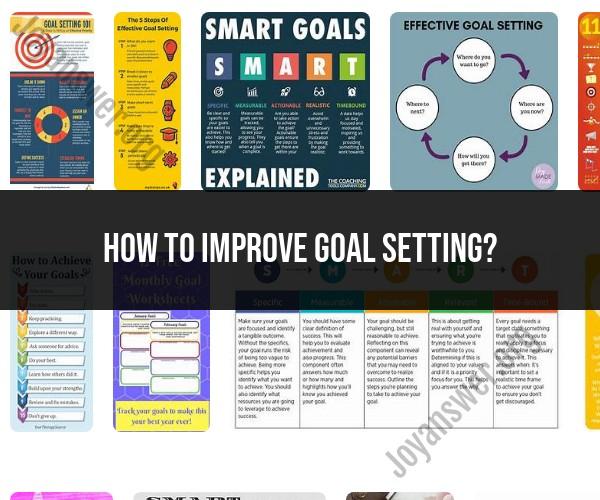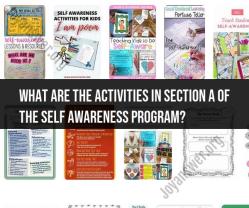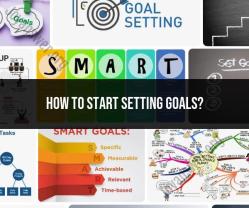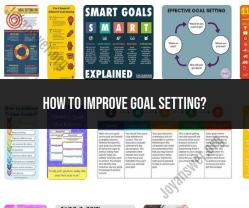How to improve goal setting?
Improving goal setting is a key step toward achieving your desired outcomes. Whether your goals are personal or professional, here are some strategies to help you set and achieve them effectively:
Be Specific: Define your goals with clarity and precision. Vague goals are challenging to work toward. Use the SMART criteria: Specific, Measurable, Achievable, Relevant, and Time-bound.
Set Priorities: Determine which goals are most important to you and prioritize them accordingly. Focusing on a few key goals at a time can increase your chances of success.
Break It Down: Divide larger goals into smaller, manageable tasks or milestones. This makes the goal less overwhelming and helps you track progress.
Write Them Down: Document your goals in writing. This commitment reinforces your intention and serves as a reference for tracking progress.
Set Deadlines: Assign deadlines or target dates to your goals. A timeframe adds a sense of urgency and accountability.
Stay Realistic: Set achievable goals that align with your capabilities and resources. Unrealistic goals can lead to frustration and disappointment.
Be Flexible: Life can bring unexpected changes. Be open to adjusting your goals when necessary while still staying committed to your overall objectives.
Measure Progress: Regularly assess your progress toward your goals. This could involve tracking metrics, journaling, or using goal-setting apps and tools.
Stay Motivated: Find your sources of motivation. Consider why these goals are important to you, and remind yourself of these reasons regularly.
Visualize Success: Use visualization techniques to imagine yourself achieving your goals. Visualizing success can boost confidence and motivation.
Stay Accountable: Share your goals with a trusted friend, mentor, or coach. Being accountable to someone else can help you stay on track.
Learn and Adapt: Embrace setbacks and failures as opportunities for learning and growth. Adjust your approach based on what you've learned.
Seek Support: Don't be afraid to ask for help when needed. Seek guidance or mentorship from those who have experience in your goal area.
Stay Consistent: Consistency is often the key to success. Establish daily or weekly routines that align with your goals.
Celebrate Achievements: Acknowledge and celebrate your accomplishments, no matter how small. Rewarding yourself can reinforce positive behavior.
Stay Positive: Maintain a positive mindset. Believing in your ability to achieve your goals can significantly impact your success.
Review and Reflect: Regularly review your goals and progress. Reflect on what's working and what isn't, and adjust your strategy accordingly.
Avoid Overwhelm: Don't overcommit. Setting too many goals at once can lead to burnout. Focus on a manageable number of goals at any given time.
Eliminate Distractions: Identify and minimize distractions that can divert your attention from your goals.
Practice Self-Compassion: Be kind to yourself on your journey. Self-criticism can hinder progress, so practice self-compassion and self-care.
Remember that goal setting is a dynamic process. As you work toward your goals, you may need to refine or revise them based on changing circumstances and priorities. The key is to remain adaptable and committed to continuous improvement.
Elevating Your Goal Setting Skills: Tips for Improvement
Whether you're looking to achieve your personal or professional goals, setting effective goals is essential. Here are some tips for elevating your goal setting skills:
- Be specific. The more specific your goals are, the easier it will be to track your progress and stay motivated. Instead of saying "I want to lose weight," say "I want to lose 10 pounds in 3 months."
- Make your goals measurable. This will help you to track your progress and see how close you are to achieving your goals. For example, instead of saying "I want to be more successful at work," say "I want to get a promotion within the next year."
- Set achievable goals. Don't set yourself up for failure by setting unrealistic goals. Start with small, achievable goals that you can build on over time.
- Set goals that are relevant to you. Make sure that your goals are aligned with your values and priorities. If your goals are not meaningful to you, you're less likely to be motivated to achieve them.
- Set time-bound goals. Give yourself a deadline for achieving your goals. This will help you to stay focused and on track.
Mastering the Art of Setting and Achieving Ambitious Goals
Once you've learned the basics of goal setting, you can start to set more ambitious goals. Here are some tips for mastering the art of setting and achieving ambitious goals:
- Break down your goals into smaller steps. This will make your goals seem less daunting and more achievable.
- Create a plan for achieving your goals. This plan should include specific steps that you will take to reach your goals, as well as a timeline for completing each step.
- Track your progress and make adjustments as needed. It's important to track your progress towards your goals so that you can stay on track and make adjustments as needed.
- Celebrate your successes. It's important to celebrate your successes along the way, no matter how small they may seem. This will help you to stay motivated and keep moving forward.
Enhancing Your Life Through Improved Goal Setting Strategies
Improved goal setting strategies can enhance your life in many ways. For example, goal setting can help you to:
- Increase your motivation and productivity. When you have clear goals to work towards, you're more likely to be motivated and productive.
- Improve your focus and concentration. When you're working on a goal, you're more likely to focus on the task at hand and avoid distractions.
- Boost your self-confidence and self-esteem. As you achieve your goals, you'll gain confidence in your abilities and your ability to achieve your dreams.
- Create a more fulfilling and meaningful life. When you're living a life that is aligned with your goals and values, you're more likely to feel fulfilled and satisfied.
By following these tips, you can elevate your goal setting skills, master the art of setting and achieving ambitious goals, and enhance your life in many ways.







